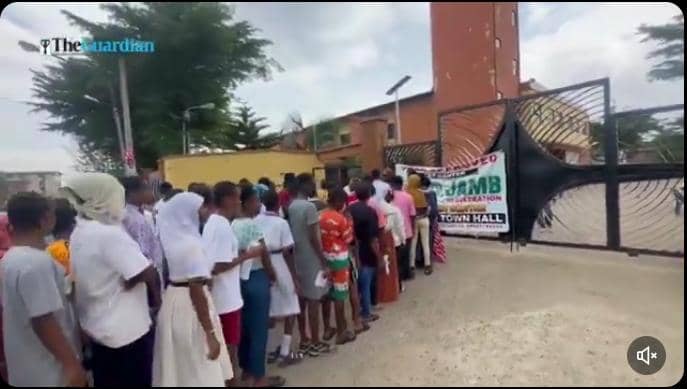The 2025 Unified Tertiary Matriculation Examination (UTME), conducted by the Joint Admissions and Matriculation Board (JAMB), has been a significant milestone for millions of Nigerian students aspiring to secure admission into tertiary institutions. However, this year’s examination process hit a snag due to a technical glitch that affected a substantial number of candidates. As of today, May 17, 2025, candidates impacted by this issue are seated for their rescheduled exams, marking a critical step toward resolving the disruption. In this detailed blog post, we delve into the nature of the glitch, JAMB’s response, the rescheduling process, challenges faced by candidates, and the broader implications for Nigeria’s education system.
The JAMB 2025 UTME Glitch: What Happened?
The 2025 UTME, which commenced in late April, saw millions of candidates across Nigeria participate in the computer-based test (CBT) to secure admission into universities, polytechnics, and colleges of education. However, a technical issue disrupted the process for a significant number of candidates. According to JAMB, approximately 379,997 candidates from 157 examination centres, primarily in Lagos and the South-East zones, were affected by a glitch caused by an unapplied system update. This update failure prevented the proper upload of candidates’ exam responses, rendering their initial test attempts incomplete or invalid.
The glitch was not immediately apparent during the initial examination period, as many candidates completed their tests without visible issues. However, post-exam analysis revealed that the responses of affected candidates were not correctly recorded in JAMB’s database, necessitating a resit. The scale of the issue, affecting nearly 380,000 candidates, underscores the complexity of managing a nationwide CBT system and highlights the challenges of maintaining technological reliability in high-stakes examinations.
JAMB’s Response: Swift Action and Transparency
Upon identifying the glitch, JAMB acted promptly to address the issue and communicate with stakeholders. The board issued a public statement acknowledging the problem and outlining its plan to conduct rescheduled exams for affected candidates. The rescheduling process was designed to ensure fairness, allowing all impacted candidates an opportunity to retake the exam without penalty.
JAMB’s response included the following key actions:
-
Identification of Affected Candidates: JAMB conducted a thorough review of its systems to identify the 379,997 candidates whose responses were not properly uploaded. This process involved cross-referencing data from the 157 affected centres to ensure no candidate was overlooked.
-
Communication with Candidates: Affected candidates were notified through multiple channels, including text messages, emails, and phone calls. JAMB also advised candidates to reprint their examination slips from the JAMB portal to confirm their new exam dates, times, and venues.
-
Coordination with WAEC: The rescheduling period coincided with the ongoing West African Senior School Certificate Examination (WASSCE), posing a potential conflict for candidates sitting both exams. JAMB collaborated with the West African Examinations Council (WAEC) to avoid scheduling conflicts, particularly for subjects like Agricultural Science, which is part of the WASSCE timetable. Candidates with clashing schedules were prioritized for alternative dates or times.
-
Rescheduling Timeline: The resit exams were scheduled to take place from May 16 to May 19, 2025, with the majority of candidates assigned to Friday, May 16, and Saturday, May 17. This tight timeline was designed to minimize delays in the admission process while ensuring all candidates could participate.
-
Technical Fixes: JAMB assured candidates and stakeholders that the technical issues responsible for the glitch had been resolved. The board conducted system checks and updates to prevent a recurrence during the resit exams.
JAMB’s proactive approach and transparency in addressing the glitch have been commendable, though not without challenges, as we’ll explore later.
The Rescheduling Process: Logistics and Execution
The rescheduling of exams for nearly 380,000 candidates across 157 centres is a logistical feat that requires meticulous planning and coordination. JAMB leveraged its existing infrastructure of CBT centres to accommodate the resit exams, ensuring that venues were adequately equipped and staffed. Candidates were reassigned to centres as close as possible to their original locations, though some reported having to travel to different venues due to capacity constraints.
To facilitate a smooth process, JAMB implemented the following measures:
-
Reprinting of Exam Slips: Candidates were required to log into the JAMB portal to reprint their exam slips, which contained updated information about their resit date, time, and venue. This step was critical to avoid confusion and ensure candidates appeared at the correct locations.
-
Extended Support Channels: JAMB activated its helpdesk and social media platforms to address candidates’ queries and concerns. Candidates experiencing issues with their slips or notifications were encouraged to contact JAMB directly for assistance.
-
Security and Integrity Measures: To maintain the integrity of the resit exams, JAMB deployed invigilators, supervisors, and biometric verification systems to prevent malpractice. The board also warned candidates against engaging in examination misconduct, emphasizing that violators would face severe penalties.
As of today, May 17, 2025, reports indicate that the resit exams are proceeding smoothly in most centres, with candidates seated for their tests. However, the process has not been without its challenges, as public sentiment and candidate feedback reveal.
Challenges and Criticisms
While JAMB’s efforts to address the glitch are noteworthy, the rescheduling process has faced several criticisms, particularly from candidates, parents, and education stakeholders. Some of the key challenges include:
-
Short Notice Period: The announcement of the resit exams, followed by a tight timeline (May 16–19), left many candidates with limited time to prepare. For students already juggling WASSCE commitments, the sudden need to revisit UTME preparation was particularly stressful. Education advocates have argued that JAMB could have provided a longer lead time to ease the burden on candidates.
-
Communication Gaps: While JAMB utilized multiple communication channels, some candidates reported delays in receiving notifications or confusion about their resit details. Issues with accessing updated exam slips on the JAMB portal further compounded these challenges.
-
Logistical Concerns: Candidates assigned to new exam centres, particularly those in rural areas, faced difficulties with transportation and accommodation. The financial burden of traveling to distant venues was a significant concern for some families.
-
Lingering Doubts About Technical Reliability: The scale of the glitch has raised questions about the robustness of JAMB’s CBT infrastructure. Candidates and stakeholders have expressed skepticism about whether the technical issues have been fully resolved, fearing a potential recurrence during the resit exams.
-
Psychological Impact on Candidates: The uncertainty caused by the glitch and the need to retake the exam has taken a toll on candidates’ mental well-being. Many students, who had already endured the stress of the initial UTME, now face additional pressure to perform under constrained circumstances.
Public sentiment on platforms like X reflects these frustrations, with hashtags such as #JAMBGlitch2025 and #UTMEResit trending in recent days. Posts from candidates and parents highlight concerns about the rushed timeline, communication challenges, and the broader reliability of JAMB’s systems. Some users have called for greater accountability from JAMB, while others have urged the board to consider alternative solutions, such as extending the admission timeline to accommodate affected candidates.
Broader Implications for Nigeria’s Education System
The JAMB 2025 UTME glitch and its aftermath raise important questions about the intersection of technology, education, and equity in Nigeria. While the adoption of CBT has streamlined the examination process and reduced instances of malpractice, it also exposes candidates to the risks of technical failures. The fact that nearly 380,000 candidates—representing a significant portion of the UTME population—were affected underscores the need for robust, scalable, and resilient systems.
This incident also highlights the challenges of coordinating large-scale examinations in a country with diverse infrastructural realities. While urban centres like Lagos have access to well-equipped CBT facilities, rural areas often face issues with power supply, internet connectivity, and technical support. Addressing these disparities will be critical to ensuring equitable access to education opportunities.
Furthermore, the glitch has sparked a broader conversation about the mental and emotional well-being of students navigating high-stakes examinations. The pressure to perform in the UTME, coupled with unexpected disruptions like this, can have lasting effects on candidates’ confidence and academic trajectories. Education stakeholders are calling for greater support systems, including counseling services and flexible admission policies, to mitigate these impacts.
Looking Ahead: Lessons and Opportunities
As JAMB wraps up the resit exams over the next few days, the board has an opportunity to reflect on this experience and strengthen its processes. Some potential areas for improvement include:
-
Enhanced System Testing: JAMB should conduct rigorous pre-examination testing of its CBT systems to identify and address potential vulnerabilities before the exam period begins.
-
Improved Communication Protocols: Clearer, more timely communication with candidates, including backup notification systems, could reduce confusion during crises.
-
Flexible Rescheduling Options: Providing a longer window for resit exams or offering candidates multiple date options could alleviate logistical and psychological pressures.
-
Investment in Infrastructure: Collaborating with government and private partners to upgrade CBT centres, particularly in underserved areas, would enhance the reliability of the examination process.
For candidates currently seated for the resit exams, we wish you strength, focus, and success. Your resilience in the face of this challenge is a testament to your determination to pursue your academic dreams. As the 2025 UTME process continues, we encourage stakeholders to advocate for a fair, transparent, and student-centered approach to education in Nigeria.
Conclusion
The JAMB 2025 UTME glitch has been a significant hurdle for nearly 380,000 candidates, but JAMB’s swift response and commitment to fairness have paved the way for a resolution. As resit exams take place from May 16 to May 19, 2025, the focus remains on ensuring that every affected candidate has a fair chance to demonstrate their abilities. While challenges remain, this incident offers valuable lessons for strengthening Nigeria’s examination systems and supporting students in their pursuit of higher education.
Stay tuned to our blog for updates on the 2025 UTME and other education-related news. If you’re a candidate or parent navigating this process, feel free to share your experiences in the comments below—we’d love to hear from you!
Join our Whatsapp channel to stay updated always!


